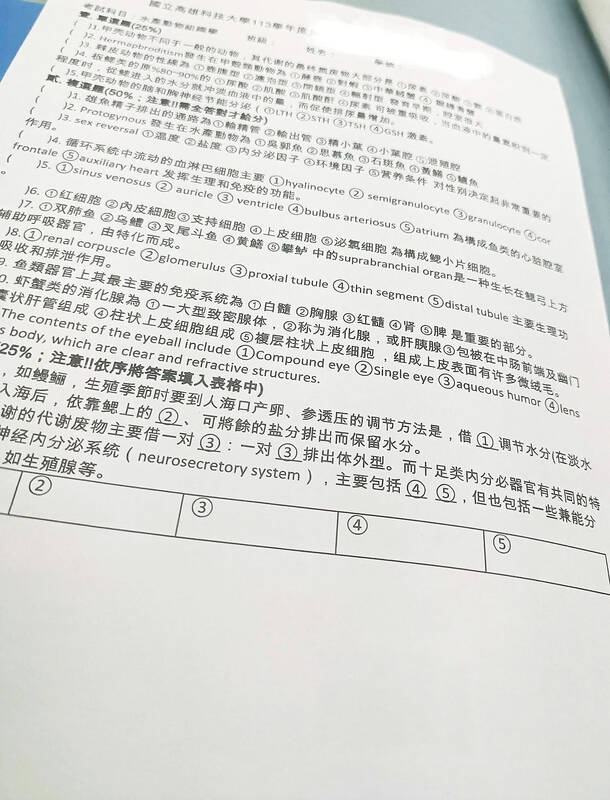National Kaohsiung University of Science and Technology (NKUST) yesterday promised it would increase oversight of use of Chinese in course materials, following a social media outcry over instances of simplified Chinese characters being used, including in a final exam.
People on Threads wrote that simplified Chinese characters were used on a final exam and in a textbook for a translation course at the university, while the business card of a professor bore the words: “Taiwan Province, China.”
Photographs of the exam, the textbook and the business card were posted with the comments.

Photo: Screen grab from Threads
NKUST said that other members of the faculty did not see the exam before it was given to students and that all exams would use traditional characters.
The usual professor is on leave and a part-time instructor accidentally included simplified Chinese while preparing the exam using external materials, it said.
Regarding the textbook, there is no traditional Chinese version of it, so the instructor used versions written in simplified Chinese and English, it said, adding that the English-language material was not used in the exam.
As it was a translation course, the instructor was allowed to use content in simplified Chinese as a reference and as practice for the students, it said.
The use of traditional Chinese characters is strongly encouraged, NKUST said.
While the Ministry of Education does not mandate the use of traditional Chinese characters, it would bolster guidelines for instructors and continue promoting traditional characters, it added.
The business card bearing the words “Taiwan Province, China” was a personal card of a professor and was not issued by the university, it said.
Kaohsiung City Councilor Chang Po-yang (張博洋) said that the government should do a nationwide inspection of professors to uncover Chinese Communist Party agents in higher education.
Infiltrating the education system is part of China’s “united front” efforts, Chang said, adding that the government would uncover a “mountain” of evidence if it looked into the situation.

A magnitude 4.9 earthquake struck off Tainan at 11:47am today, the Central Weather Administration (CWA) said. The hypocenter was 32.3km northeast of Tainan City Hall at a depth of 7.3km, CWA data showed. The intensity of the quake, which gauges the actual effect of a seismic event, measured 4 in Tainan and Chiayi County on Taiwan's seven-tier intensity scale, the data showed. The quake had an intensity of 3 in Chiayi City and County, and Yunlin County, while it was measured as 2 in Kaohsiung, Nantou County, Changhua County, Taitung County and offshore Penghu County, the data showed. There were no immediate reports of

Weather conditions across Taiwan are expected to remain stable today, but cloudy to rainy skies are expected from tomorrow onward due to increasing moisture in the atmosphere, according to the Central Weather Administration (CWA). Daytime highs today are expected to hit 25-27°C in western Taiwan and 22-24°C in the eastern counties of Yilan, Hualien, and Taitung, data on the CWA website indicated. After sunset, temperatures could drop to 16-17°C in most parts of Taiwan. For tomorrow, precipitation is likely in northern Taiwan as a cloud system moves in from China. Daytime temperatures are expected to hover around 25°C, the CWA said. Starting Monday, areas

Taiwan has recorded its first fatal case of Coxsackie B5 enterovirus in 10 years after a one-year-old boy from southern Taiwan died from complications early last month, the Centers for Disease Control (CDC) said yesterday. CDC spokesman Lo Yi-chun (羅一鈞) told a news conference that the child initially developed a fever and respiratory symptoms before experiencing seizures and loss of consciousness. The boy was diagnosed with acute encephalitis and admitted to intensive care, but his condition deteriorated rapidly, and he passed away on the sixth day of illness, Lo said. This also marks Taiwan’s third enterovirus-related death this year and the first severe

A Taiwanese software developer has created a generative artificial intelligence (AI) model to help people use AI without exposing sensitive data, project head Huang Chung-hsiao (黃崇校) said yesterday. Huang, a 55-year-old coder leading a US-based team, said that concerns over data privacy and security in popular generative AIs such as ChatGPT and DeepSeek motivated him to develop a personal AI assistant named “Mei.” One of the biggest security flaws with cloud-based algorithms is that users are required to hand over personal information to access the service, giving developers the opportunity to mine user data, he said. For this reason, many government agencies and